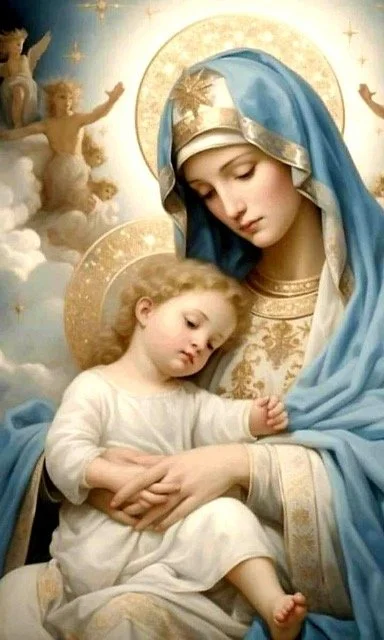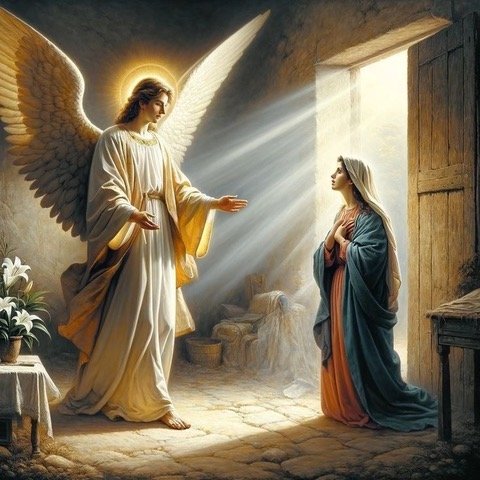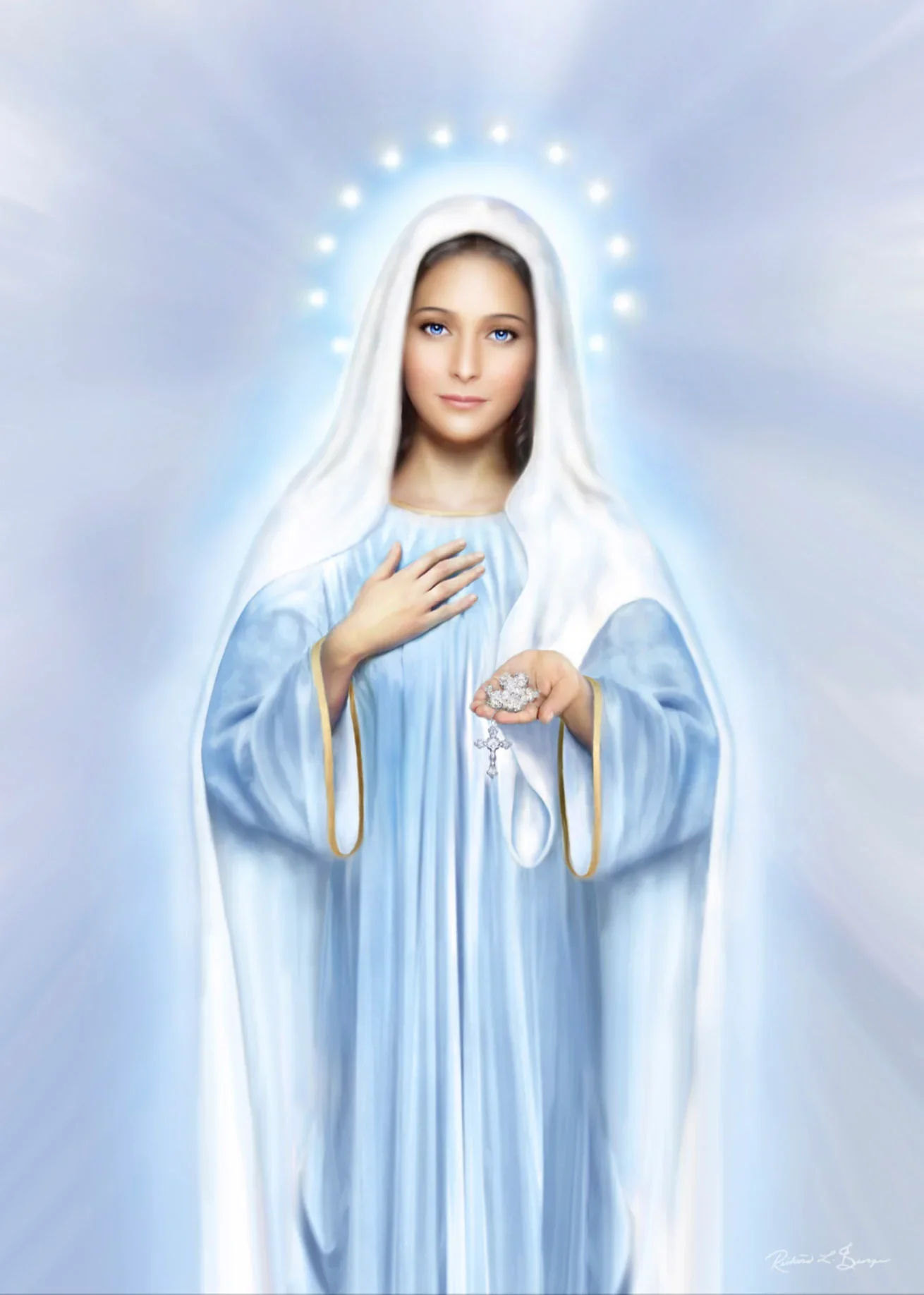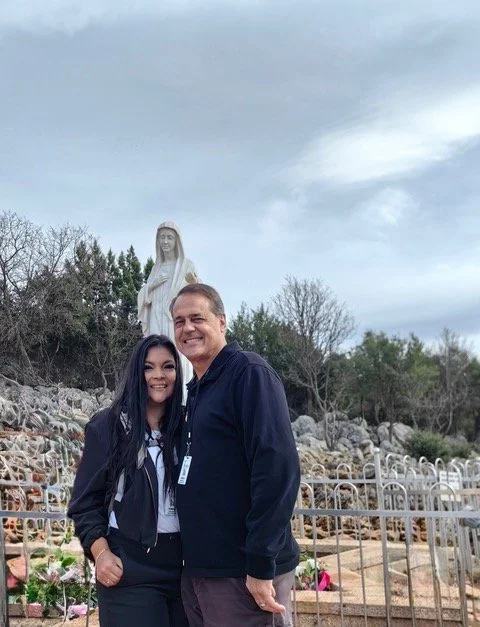Explaining Mary
To our Friends of Jesus and Mary -
We recently received some questions about Mary from some devout Christian believers who are well-versed in their solid faith. These good folks follow Jesus closely in their daily walk and witness a steady example of discipling Jesus on a daily basis. In their quest to strictly follow the living Word of God as revealed in the Bible (sola scriptura), they posed several questions to us that challenged the role of Mary in our spiritual lives. We thought you would like to hear about our response to defend our Catholic views of Mary, so here you go…
To address your comments on Mary, we would first like to clarify the goals we hope to achieve. Scholars of the Faith have written about Mary for nearly 2,000 years, and it would be impossible to cover all of that in a single email. Instead, our intention is to open a theological conversation aimed at building as much common understanding as possible in the spirit of unity in Christ, while also creating opportunities to pray together more effectively. Therefore, we propose that our goal be to grow closer to Jesus by deepening our understanding of the role of His Blessed Mother in our lives, as designed by our Father and Creator.
Before beginning a more formal study, it is helpful to clarify a few aspects of how we worship God. We cherish quiet moments of direct communication with the Father, the Son, and the Holy Spirit. At times we speak to our Father, our Creator and Provider; at other times, to Jesus, our Savior and Friend; and at still other times, to the Holy Spirit, our Advocate and Counselor. We also sometimes invite our family members and friends in the flesh to pray to God with us or on our behalf. In the same way, we may ask Mary, one of our beloved Saints, or a loved one who has died to join us in bringing our prayers before God.
It’s not that we can’t talk to Jesus without Mary, for we directly talk to Jesus all the time. And it’s not that we always approach Jesus through Mary, or that we think that Jesus needs Mary to save us. On this point we can all agree, Jesus is the full sufficiency of our salvation. “My God will supply all your need according to His riches in glory by Jesus Christ” (Philippians 4:19).
We can also agree that we can all help one another become closer to Jesus. And those who are closest to Jesus can especially help us get closer to Him, which is why we ask Mary and Joseph and other saints for their help. “I urge then, first of all, that petitions, prayers, intercession, and thanksgiving be made for all people…” (1 Timothy 2:1).
Although we can always speak directly to Jesus and do not need Mary in order to do so, God has given us Mary as a special gift, just as He has given us to one another. The more we love and care for each other, the more fervent and powerful our prayers become—for what Christian parent would not pray with deep supplication and tears for their beloved children? The greater the love for the person being prayed for, the more powerful the prayer. Consider Jesus in the garden on that night: out of love for us, He prayed with such intensity that His sweat became like drops of blood. “And being in agony, He prayed more earnestly; and His sweat was as it were great drops of blood falling down to the ground.” (Luke 22:44)
So the question of Mary being an effective intercessor for us can be answered by her intense love for Jesus and therefore her intense love for us in Him. Whether or not she is our spiritual mother is another matter and would only heighten her care and concern for us. So our debate should not be to refute her motherhood, rather we should be asking her to be our mother, even beseeching her for that privilege. Nevertheless, we do have some interesting considerations in this regard.
If we are to call Jesus our brother, then it certainly follows that His mother would consider us her children too. God, in His foresight predestined those He foreknew to become like His Son, Jesus Christ, to establish Him as the firstborn among many brothers and sisters. (Romans 8:29) We might think that scripture has to prove to us that Mary is our mother, but it is actually much more simple than that. What do you think Mary thinks? After all, if she wants to be our spiritual mother because of her immense love for us, then she will be, and she will also be praying for us. So then it’s a question of the Father’s plan, for certainly Mary will do whatever He asks, just like she did while on earth. “I am the handmaid of the Lord. May it be done unto me according to your word.” (Luke 1:38)
Well, Jesus had something to say about that from the cross. “When Jesus saw His mother, and the disciple whom He loved standing nearby, He said to His mother, ‘Woman, behold, your son!’ Then He said to the disciple, ‘Behold, your mother!’ And from that hour the disciple took her into his home” (John 19:26–27). We realize this passage can be interpreted in different ways. And while the Catholic Church says that the disciple John represents all of us, therefore Jesus gave Mary as a mother to all of us, some other institutions don’t understand it that way. But maybe others are missing the point here for, in that act, Christ is not diminishing His unique mediation, but simply sharing His love by entrusting His Mother to us as a spiritual gift. Regardless of any technical theological interpretation, if Jesus wanted Mary by His side at both the beginning and the end of His earthly life, how much more should we treasure her presence in our Christian walk.
We don’t need to debate Biblical interpretations about Mary being our mother or not being our mother, because the actual reality is that Mary is a mother. She, in her inmost being is a mother… That is how she loves, that is how she moves, that is how she thinks. Just as I (Phil) am a father after raising seven children and now adding three more… I love like a father, I act like a father… I provide and protect and push and correct… I live and breath fatherhood even with people with whom I’m not their biologically father. And unlike me who is imperfectly, interiorly wired as a father, Mary (In the fullness of God’s grace) is perfected in her interior disposition of motherhood. That is to say that Mary is a mother to her core, and she relates to Jesus and to us as a mother relates to her children.
If Mary adopts us as our spiritual mother, then what a beautiful gift that is for us. Let’s not try to debate our way into diminishing her role, rather let’s work together to prove it more profoundly so that we can enjoy the incredible benefits she brings to us… Her nurturing love, her intercession, her encouragement, her guidance, and even her constructive correction.
To better understand Mary’s role in our lives and the miraculous beauty of her role in God’s plan of salvation, let's first explore the role of Mary in the life of the Holy Trinity. Mary is the daughter of the Father, the spouse of the Holy Spirit, and the mother of Jesus. Those family bonds of Mary to each person of the Holy Trinity are in themselves an indication that Mary is the most significant human being ever created.
God the Father loves Jesus so much that we can’t even fathom the degree and intensity of that love. And the Father made everything in the universe as a gift for Jesus, creating all with Jesus, through Jesus, and for Jesus. “For in Him all things were created; things in heaven and on earth, visible and invisible, whether thrones or powers or rulers or authorities; all things have been created through Him and for Him.” (Colossians 1:16) So as the Father is filled with Goodness, Truth, and Beauty, how could He not create the most Good and True and Beautiful person of His creation from whom Jesus was to receive His humanity. Jesus is both fully God and fully human, and he received His humanity from Mary, genetics and all.
Why would the Father, Who’s most beautiful creation was Jesus as human, force Him into a soul full of the ugliness and impurity of sin? Actually, the Father wouldn’t do that, rather He designed the second most beautiful and pure wonder of all Creation in the most magnificent soul of Mary.
“‘Hail, full of grace. The Lord is with you’ (Luke 1:28). The Greek term kecharitomene translates to ‘full of grace.’ It implies a deep, continuous, and permanent presence of God’s favor and life, who is the source of all life. ‘The Lord is with you,’ indicates the profound presence of God in Mary’s soul, and a prelude to His plan for her to bear His own Son. This greeting highlights Mary’s special role in salvation history, chosen by the Father from all eternity to be the mother of Jesus. The full grace Mary received signifies that she was conceived without sin, a doctrine known as the Immaculate Conception.” (Anonymous Commentary).
Well, scripture might not explicitly say that Mary is the Immaculate Conception, but the words, “Full of Grace" and "The Lord is with you,” single her out in all of creation, for no one else in scripture has ever been described that way. Moreover, these two descriptions of Mary substantiate the full presence of God in her, and therefore the absence of sin in her — which is much more plausible than Mary receiving Jesus with sin, especially when considering that His humanity came from her egg as expressed all the way back in Genesis. “And I will put enmity between you and the woman, between your seed and her seed; He will crush your head and you will strike at His heel.” (Genesis 3:15)
In reference to your questions about Mary’s integrity — In contrast to any lack of virtue, let’s continue with Mary’s heightened virtues as evidenced by her role as the spouse of the Holy Spirit. This is a real relationship that she has with the Holy Spirit. Of course, we are all invited to a relationship with the Holy Spirit as Jesus declares several times to the Apostles, especially after His resurrection. But to none of us, other than Mary, does the angel of the Lord answer, “The Holy Spirit will come over you, and the power of the Most High will overshadow you. So the holy one to be born will be called the Son of God.” (Luke 1:35)
So the Holy Spirit came over Mary and impregnated her with the Son of God. Okay, so what then is Mary’s relationship with the Holy Spirit? She’s definitely not acting there as His daughter… definitely not His Mother… and definitely not just a friend! The only viable conclusion is that Mary has a very unique relationship with the Holy Spirit. How can anyone really think the Father is going to choose for the Holy Spirit a spouse who is anything less than fully virtuous? And how could the Father choose for His only Son a mother who was sinful?
God, our Father is the most thoughtful, caring, considerate, generous, amazing, powerful, beautiful everything! When He conceived the plan of Creation and Salvation, He thought of all of us at the same time, and He planned a role for all of us, including Mary… especially Mary. The single most defining quality of God is love, for God is love (1 John 4:8). So when God formed mankind in His own image, He formed us with the ability to love. But that ability got damaged through original sin, the effects of which handicap us all in the practice of love. Yet God gives us Himself, through Jesus, in the Holy Spirit, as the antidote for sin and the power to overcome sin through virtue — that is through love — that is God Himself dwelling in us.
So when God sent His only Son into the world, He sent Him into Mary, through the Holy Spirit, to be love for the world, and to teach us how to love. Because we have free will, the only way for Jesus to come into Mary was for her to first say yes. So Mary’s yes (fiat: surrender) was because she was already “Full of Grace”… That is to say she was already “Full of God’s presence”… She was “Full of Life”… She was “Full of Love” even before Jesus arrived. God and sin cannot mix together. God cannot be tainted by sin, nor can He be united with it. So when God proclaims in the Bible that Mary is full of Grace, that means that she is full of Himself… Full as in completely, with no room for sin to co-exist in her being along with God, and no place for sin in her soul that was united to God even before Jesus arrived. Then with the unselfish obedience of her yes to God through the angel, the Holy Spirit fertilized her human egg with the Divine power that instantly made Jesus both fully God and fully man. Jesus then continued to be nourished by Mary for nine months in her womb, and then mothered by her for the next 30 years afterwards.
Saint Paul tells us that Jesus was perfected through suffering. This idea is a great mystery because Jesus was already perfect, yet we are told that, “In bringing many sons and daughters to glory, it was fitting that God, for whom and through whom everything exists, should make the author of their salvation perfect through what He suffered. (Hebrews 2:10) Thus we can conclude that when Jesus came to Mary, she was not yet fully perfected in love. However, she was His first student, and His first disciple. She therefore disciples us because that’s what disciples do! And Mary intercedes for us because that's what mothers do!
So we can look to Mary as not only our intercessor, but also as our role model in discipling others. Just as we ask each other for help, and just as we disciple one another, we ask Mary and other holy people to help us and they also continue to disciple us. Also, we believe it can be said (without too much scandal) that Mary is the first and greatest disciple of Jesus. After all, she knew Him first and she raised Him. To be a disciple is to intimately know the teacher, so as to better live like Him, and Mary knew Jesus more intimately than anyone. And certainly she knew His mission as well as anyone and she also participated in His mission in the most intimate, profound, and united way of anyone. It is moving to reflect that God willed His Son’s first human gaze at His birth to fall upon Mary, His Mother (Luke 2:7). And at the end, when Jesus offered His life for us, He also willed Mary to be there — standing faithfully beneath the Cross (John 19:25)… (Anonymous commentary)
Mary also participated in Christ’s suffering more than anyone, for not only was she there at the foot of the cross, but she was his true mother—the most caring, concerned, and broken-hearted person to see him suffer and die, especially on a cross. “Now I rejoice in what I am suffering for you, and I fill up in my flesh what is still lacking in regard to Christ’s afflictions, for the sake of His body, which is the church" (Colossians 1:24). The phrase, “what is lacking in Christ’s afflictions," does not mean that Christ’s suffering was insufficient for our salvation, rather it refers to the portion of suffering appointed for the body of Christ, which believers are invited to share in through their spiritual union with Jesus. Thus, we are all invited to share in the redemptive suffering of Christ, of which Mary is the first and greatest. And that is why we refer to Mary as a mediator… Not as a mediator to the Father in place of Jesus, but as a mediator for us with Jesus. “For there is one God, and there is one mediator between God and men, the man Christ Jesus.” (1 Timothy 2:5)
This seems like a good place to insert some writings from theologians, or at least from someone who is more well-versed in scripture than we are. It may provide more credibility to quote a more professional source on Mary. Let’s start with the founder of the Protestant reformation himself, Martin Luther. You may be surprised to read about his own personal convictions about Mary…
“She became the Mother of God, in which work so many and such great good things are bestowed on her as surpass man’s understanding. For on this there follows all honor, all blessedness, and her unique place in the whole of mankind, among which she has no equal, namely, that she had a child by the Father in heaven” - Martin Luther
“God has formed the soul and body of the Virgin Mary, full of the Holy Spirit so that she is without all sins, for she has conceived and borne the Lord Jesus.” - Martin Luther
“Christ, our Savior, was the real and natural fruit of Mary’s virginal womb… This was without the cooperation of a man, and she remained a virgin after that. Christ was the only Son of Mary, and the Virgin Mary bore no children besides Him.” - Martin Luther (The Biblical reference to Jesus’ brothers and sisters does not clarify the semantics of the culture, which utilizes the term “brother” to designate a close family relative as a cousin or in-law)
“The veneration of Mary is inscribed in the very depths of the human heart.” - Martin Luther
“Mary is the Mother of Jesus and the Mother of all of us even though it was Christ alone who reposed on her knees… If he is ours, we ought to be in his situation; there where he is, we ought also to be and all that he has ought to be ours, and his mother is also our mother.” - Martin Luther
“[Mary is the] highest woman and the noblest gem in Christianity after Christ… She is nobility, wisdom, and holiness personified. We can never honor her enough.” - Martin Luther
In all fairness to the reformation, Martin Luther rejected the idea of Mary as a mediator between God and people, emphasizing that Christians can approach Christ directly. And that is what we have acknowledged in our writings above. However, Luther did ultimately direct honor to Mary for the sake of receiving God’s grace, viewing her as an instrument to direct people to Christ.
And that really is the spirit of Medjugorje, where Mary gives us messages in order to help lead us to her Son Jesus. We are not bound to follow Our Lady's messages, and in fact the Catholic Church cautions us about “Private Revelation.” The official Church position is that all Public Revelation concluded with the last book of the Bible. Yet, many miracles have occurred through people over the last few thousand years — some by people who are still alive, and some by those who have passed from this world. “Truly, truly, I say to you, whoever believes in Me will also do the works that I do; and do even greater works than these will he do, because I am going to the Father” (John 14:12).
You are right that the Church has not given definitive approval of Medjugorje. It is always very cautious and slow, especially on such important matters of apparitions and private revelations. The mysterious activities happening in Medjugorje are no exception. The Vatican has maintained a prudent stance: “non constat de supernaturalitate” (it is not yet confirmed supernatural). At the same time, the Church has also not condemned it. In fact, Pope Francis has permitted official pilgrimages (since 2019) under Church guidance, because of the immense spiritual fruits: conversions, confessions, vocations, and a renewed love for Scripture and the Sacraments. So our own personal judgements respond to Jesus’ criteria, “You will know them by their fruits” (Matthew 7:16).
The heart of the Medjugorje messages are deeply biblical, so we read them and enjoy the fruits that come from listening to their counsel. Our Lady’s messages help us to follow Jesus more intimately as they speak to our hearts in simple ways. For some examples, here are some of our favorite messages —
Pray, Pray, Pray
Put God in the first place
Read the Bible every day
Pray with great meditation
Pray until prayer becomes a joy for you
I desire, little children, to draw you all closer to my Son Jesus
Let everything you do and everyone you meet be an encounter with God.
The five main themes of Our Lady’s messages are Prayer, Fasting, the Bible, Mass, and Confession. These are the principle ways for us to become closer to Jesus through God’s grace. The messages are all simple to follow, and they return high rewards for efforts, namely the dwelling of God’s love, peace and joy in our hearts. We enjoy the benefits of following these messages, however, we also respect the Church’s cautions about private revelation.*
*In Catholic teaching, private revelation is a divine communication from God to individuals or groups, distinct from the completed and binding public revelation found in Scripture and Tradition. Private revelations are never necessary for salvation and do not add to the deposit of faith. While they can provide insights and encouragement to live the Gospel more fully in a particular time, they must be subordinate to and never contradict public revelation. The Church discerns and approves private revelations by confirming they contain nothing contrary to faith or morals, allowing faithful to accept them with prudent adherence, but belief is never obligatory with divine and Catholic faith.
Jesus was obedient to Mary, so it follows that we should be obedient to her as well, for Jesus is our role model. After an incident in Jerusalem, when Jesus was 12 years old, Luke tells us, “Then He went down to Nazareth with them [Mary and Joseph] and was obedient to them" (Luke 2:51). And at the wedding feast of Cana, “When the wine was gone, Jesus’ mother said to Him, “They have no more wine” / “Woman, why do you involve me?” Jesus replied / “My hour has not yet come” / Then his mother said to the servants, “Do whatever He tells you” (John 2:3-5). So basically, what’s going on here is that Jesus remained obedient to Mary His whole adolescence and young adult life, even until He was thirty years old. Then He questioned Mary at the wedding feast of Cana because He wanted to make sure that she knew what it would mean for Him to fulfill her request. It meant that with this first of His public miracles, He would begin His public ministry, which would culminate in His suffering and death. She knew what it meant and gave her nod of approval for Him to begin. That moment, Jesus left the home-obedient tradition and began His public ministry, shifting His priorities from obedience to His mother towards obedience to His mission.
We share in Jesus obedience first to our own household and family responsibilities, and then to our mission to live in peace and share it with others. We are not too concerned about Mary’s soft titles like Queen of Peace, because she always points us to Jesus who is the King of Peace. The Marian title of Queen does not diminish the role of Jesus, rather compliments it as the Queen Mother, who in ancient times and middle-ages retained a highly respected role, sitting at the right hand of the King. In Revelation 12:1 we read that “A great sign appeared in heaven: a woman clothed with the sun, with the moon under her feet, and on her head a crown of twelve stars.” The Church has always seen in this woman Mary, the Mother of the Messiah. She appears at the climax of Scripture, glorified with her Son.
We can derive many appropriate comparisons from the human court to the divine, and many others have written about those concepts that we can review if needed. For now, Karen and I can simply say that for our purposes of following Jesus and developing our discipleships, Mary has been a great help to us. We offer all the above commentary and quotes not as a hinderance to growth, rather as an uplifting opportunity for a deeper relationship with Jesus through the assistance of His mother Mary and all the saints.
We believe Mary exists not as a rival to Christ, but as His masterpiece and mother, given to us by Jesus Himself. Our love for Mary never reduces our love for Jesus — it simply magnifies Him, just as Mary states in her Magnificat, “My soul magnifies the Lord, and my spirit rejoices in God my Savior” (Luke 1:46).
With the warmest regards and God’s Blessings and Peace,
Philip and Karen Zeiter, OLR






